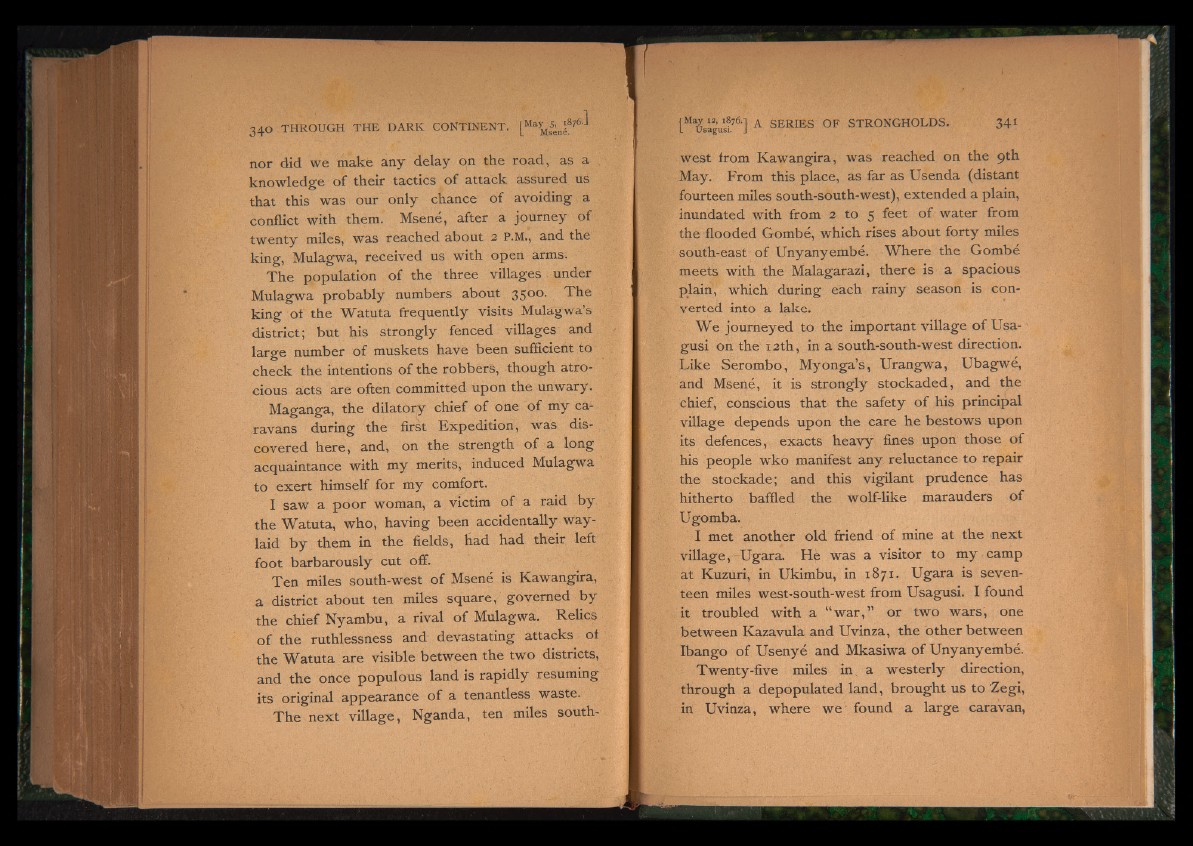
nor did we make any delay on the road, as a
knowledge o f their tactics o f attack assured us
that this was our only chance of avoiding a
conflict with them. Msene, after a journey of
twenty miles, was reached about 2 P.M., and the
king, Mulagwa, received us with open arms.
T h e population o f the three villages under
Mulagwa probably numbers about, 3 5 ° ° - The
king o f the Watuta frequently visits Mulagwa’s
district; but his strongly fenced villages and
large number o f muskets have been sufficient to
check the intentions o f the robbers, though atrocious
a;cts are often committed upon the unwary.
Maganga, the dilatory chief o f one o f my caravans
during the first Expedition, was dis-
covered here, and, on the strength o f a long
acquaintance with my merits, induced Mulagwa
to ex e rt himself for my comfort.
I saw a p oor woman, a victim o f a raid b y
the Watuta, who, having been accidentally w a y laid
b y them in the fields, bad had their left
foo t barbarously cut off.
Ten miles south-west o f Msene is Kawangira,
a district about ten miles square, governed b y
the chief Nyambu, a rival o f Mulagwa. Relics
o f the ruthlessness and devastating attacks of
the Watuta are visible between the two districts,
and the once populous land is rapidly resuming
its original appearance o f a tenantless waste.
T h e next v illa g e , Nganda, ten miles southwest
from Kawangira, was reached on the 9th
May. From this place, as far as Usenda (distant
fourteen miles south-south-west), extended a plain,
inundated with from 2 to 5 feet o f water from
the flooded Gombe, which rises about forty miles
south-east o f Unyanyembe. Where the Gombe
meets with the Malagarazi, there is a spacious
plain, which during each rainy season is converted
into a lake.
We journeyed to the important village o f Usa-
gusi on the 12th, in a south-south-west direction.
L ik e Serombo, Myonga’s , Urangwa, Ubagwe,
and Msene, it is strongly stockaded, and the
chief, conscious that the safety o f his principal
village depends upon the care he bestows upon
its defences, exacts heavy fines upon those o f
his people wko manifest any reluctance to repair
the stockade; and this vigilant prudence has
hitherto baffled the wolf-like marauders o f
Ugomba.
I met another old friend o f mine at the -next
v illa g e , Ugara. He was a visitor to my camp
at Kuzuri, in Ukimbu, in 1871, Ugara is seventeen
miles west-south-west from Usagusi. I found
it troubled with a “ w a r ,” or two wars, one
between Kazavula and Uvinza, the other between
Ibango o f Usenye and Mkasiwa o f Unyanyembe.
Twenty-five miles in, a westerly direction,
through a depopulated land, brought us to Zegi,
in Uvinza, where w e ' found a large caravan,